Search Results
Showing results 21 to 40 of 211
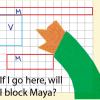
Twelve at a Time
Source Institutions
As learners play this game, they build skills in area, perimeter, multiples and factors. They take turns making rectangles with 12 squares on the grid.

Life in a Nutshell
Source Institutions
In this multi-faceted game (on pages 25-35), learners recreate what happens to creatures in the Brazilian rain forest as they grow from egg to adult—especially those that use fallen, empty Brazil nut
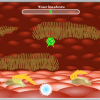
Virus Lander
Source Institutions
Can you avoid the body's immune system and make someone sick? Play this online game in which you go inside a human body to explore how viruses attack cells in the body.

Hopper Herding
Source Institutions
In this outdoor activity and game, learners roundup a "herd" of hopping insects and find out how many different kinds or species are in their herd.
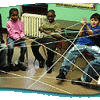
Web of Life Game
Source Institutions
In this game, learners each represent a different organism in an environment. They build a web during the activity, and discover how all the players in an ecosystem depend on each other.
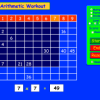
Arithmetic
Source Institutions
In this online activity, learners will brush up on their multiplication, division, and factoring skills with this exciting game.

Line Up: Using Math To Stand In Line
Source Institutions
Put math of measurement into lining up — and make waiting in line fun. Choose a size characteristic that learners can physically compare, such as foot length or hair length.

Dogs and More Dogs
Source Institutions
In this activity, learners play an evolution card game to see how selective pressures can affect an organism's evolution.
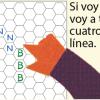
Cuatro en Línea
Source Institutions
¡Este juego de estrategia tiene reglas sencillas pero puede ser un reto! Los jugadores empiezan con una red de hexágonos vacía. En su turno cada jugador pone su inicial en un hexágono vacío.
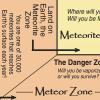
Space Rocks!: A Meteorite Game
Source Institutions
In this board game, learners explore the origins of meteors, meteoroids, and meteorites as well as the their characteristics and importance. They also discover some misconceptions about meteors.
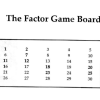
Number Systems and Number Theory: Factor Game
Source Institutions
In this math lesson, learners play a game to identify the properties of prime, composite, abundant, deficient and perfect numbers.

Exploring the Universe: Space Guess Quest
Source Institutions
Space Guess Quest is a fun game that encourages participants to identify the many types of objects in space, from human-made spacecraft to nebulas, galaxies, stars, and worlds.

Building Bingo
Source Institutions
In this on site "field trip" activity (located on pages 6-9 of PDF), learners get hands-on experience identifying building materials by playing "Building Bingo".
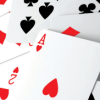
Odd Man Out
Source Institutions
In this math game (Page 14 of the Are You Game? PDF), learners determine the probability of getting an even versus an odd product using the numbers on a regular deck of cards.

Variation Game
Source Institutions
In this set of outdoor games, learners play the role of monkeys that are trying to get enough resources (food, shelter, and space) to survive.

Sound Bingo
Source Institutions
This game is like regular bingo, except the clues are sounds.
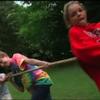
Tug-of-War
Source Institutions
This activity (on page 2 of the PDF under SciGirls Activity: Tug O' War) is a full inquiry investigation into tug-of-war physics. Groups of learners will test two tug-of-war strategies.

Polyatomic Ion Bingo
Source Institutions
This activity was designed for blind learners, but all types of learners can play this game to learn about the major polyatomic ions (an ion that consists of two different elements).
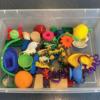
Sink or Float
Source Institutions
In this activity, learners explore and compare the buoyant properties of materials found in nature and in human-made materials.

Exploring the Solar System: Mission to Space Board Game
Source Institutions
In this tabletop board game, players will represent a team of scientists and engineers sending a spacecraft on a mission to space.
